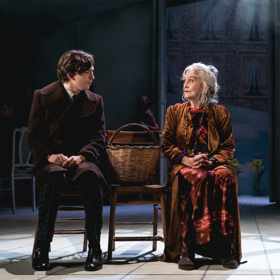Review: HAROLD AND MAUDE, Charing Cross Theatre
![]() You wouldn't expect that a play that opens with one of the leads dramatically faking his own suicide would be delightfully funny and yet Harold and Maude at the Charing Cross Theatre is just that. This quirky play is an adaption of the 1971 cult classic film of the same name and features some touching quiet moments alongside many laughs.
You wouldn't expect that a play that opens with one of the leads dramatically faking his own suicide would be delightfully funny and yet Harold and Maude at the Charing Cross Theatre is just that. This quirky play is an adaption of the 1971 cult classic film of the same name and features some touching quiet moments alongside many laughs.
 It tells the story of an odd pair of friends in the United States in the 1970s: free-spirited, elderly Maude and morose 19-year-old Harold. Maude is an Austrian countess immigrant who has led a fascinating life traveling the world, even posing nude for an abstract painting she displays in her home. At the age of 79, she still climbs trees and steals animals from the zoo to free them.
It tells the story of an odd pair of friends in the United States in the 1970s: free-spirited, elderly Maude and morose 19-year-old Harold. Maude is an Austrian countess immigrant who has led a fascinating life traveling the world, even posing nude for an abstract painting she displays in her home. At the age of 79, she still climbs trees and steals animals from the zoo to free them.
In contrast, Harold is a young man who enjoys going to funerals and faking his own suicide to gain attention from his socialite mother. The play tells the story of their friendship, which eventually turns to romance, and asks the audience to reassess its thoughts on the boundaries of age and relationships.
The play was written by the film's screenwriter, Colin Higgins, and first premiered onstage in 1974. This revival, directed by Thom Southerland, is undeniably charming in its eccentricity. The action is accompanied by cheerful music, composed by Michael Bruce and played by the ensemble members onstage as they look on.
The show is filled with humour, from the dark comedy of Harold's fake suicide attempts to his mother Helen's hilarious one-liners. One of the best moments of the show is when Helen fills out a National Computer Dating Service application for Harold (though her answers seem to focus more on her opinions than his) as he fakes blowing himself up while upbeat music plays.
Sheila Hancock is stunning as Maude, managing to combine both whimsy and gravity. Her touch of a Viennese accent is effectively continental without being a distraction. While her amusing moments bring laughter from the audience, even more impressive is the way she handles the hints at Maude's experiences during World War II with a grief that feels ready to bubble to the surface. Hancock may be 85, but her performance is energetic and spectacular.
Bill Milner brings an endearing awkwardness to Harold that wins over the audience despite his character's strange habits. He is appropriately vacant at the beginning of the play, but seems to visually blossom as the evening goes on.
It's a pleasure to watch Milner build Harold's arc from a despondent suicide-obsessed boy to a caring young man who finds joy in the world and in Maude. The most touching moment of the show may be when he reveals to Maude the reason he fakes his own suicides, with a childlike truth to his words.
Rebecca Caine is wonderfully funny and over the top as Harold's mother, who is determined to find him an appropriate bride. When he fakes shooting himself in front of a potential wife, she simply barks, "Harold, not in the daffodils!" Caine manages to capture the essence of the American socialite mother of the late 20th century who cares about her son, but cares about the family's reputation more.
A small ensemble rounds out the cast with Johnson Willis playing the earnest and ultimately kind-hearted Father Finnegan with surprising honesty. Joanna Hickman is entertaining as Harold's three dates, making each one astoundingly horrible in a different way. It was good to see Anthony Cable return to the Charing Cross Theatre again as the Gardener/Inspector Bernard, following his run in The Woman in White.
Francis O'Connor's set gives a lovely atmosphere to the piece and the scattered props and set-pieces are intriguing. The contrast of the clouds painted on the ceiling and the noose hung centre stage at the beginning gives a strangely apt preview of what the show will be.
Jonathan Lipman's costumes are gorgeous and appropriately 1970s, from Harold's flared trousers to Helen's gowns. Maude's dresses and ensembles reflect her eccentricity perfectly and are utterly sumptuous. I was impressed by how many costume changes they fit into a two-hour play.
The subject of Harold and Maude is undoubtedly a bit touchy, as a relationship with a 60-year age gap isn't exactly standard. Whatever your thoughts on it, the play does encourage the audience to look at the elderly female body as something beautiful rather than something to be avoided, which is worth celebrating.
Harold and Maude is a beautiful production of a play that asks its viewers to reconsider their views and beliefs about life. Maude asks, "Harold, are you going to do it or are you only going to hear about it second-hand?" Her message of having passion and joy for life provides a lesson not just for Harold, but for the audience as well.
Harold and Maude is on at Charing Cross Theatre until 31 March.
Photo Credit: Darren Bell
Reader Reviews


